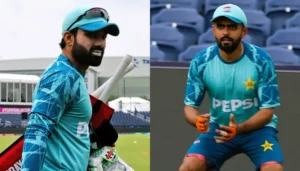The cricketing community was taken aback when the Pakistan Cricket Board (PCB) announced the termination of fast bowler Haris Rauf’s central contract just days before the commencement of the ninth edition of the Pakistan Super League (PSL). This decision has stirred a considerable amount of controversy and debate, particularly among the ranks of Lahore Qalandars, the franchise for which Rauf plays in the PSL.
Prelude to the Controversy
Haris Rauf, celebrated for his speed and ability to deliver crucial overs, faced punitive action from the PCB following an investigation into his decision not to join Pakistan’s Test squad for their tour of Australia for the 2023-24 series. The sudden announcement of his contract termination by the PCB has been widely criticized for its timing and lack of communication, especially given the absence of an immediate Pakistan series.
Lahore Qalandars’ Discontent
Sameen Rana, the owner of Lahore Qalandars, expressed his dissatisfaction and concern over the PCB’s handling of the situation.

Rana pointed out the lack of urgency for such an announcement, emphasizing that there were no forthcoming series or emergencies that necessitated the abrupt termination of Rauf’s contract. He argued that this decision not only lacked a solid rationale but also severely impacted Rauf’s morale and mental well-being, given that representing Pakistan has been his lifelong ambition.
A Critique on PCB’s Communication
Rana’s critique extended beyond the timing of the announcement to how the PCB communicated its decision. The absence of direct communication with Rauf—no calls, emails, or messages—was termed as a glaring oversight in professionalism and basic decency. This act of negligence was labeled as poor management by Rana, reflecting a broader concern regarding the PCB’s approach to handling its players.
Broader Implications for Haris Rauf
The repercussions for Rauf extended beyond the loss of his central contract. The fast bowler was also barred from participating in any overseas T20 leagues until June 30, 2024, a restriction that not only affects his career trajectory but also his potential earnings and international exposure. This decision further underscores the punitive nature of the PCB’s actions and raises questions about its long-term impact on Rauf’s professional career.
The Impact on the Pakistan Super League
The PCB’s decision to terminate Rauf’s contract just before the PSL’s ninth edition has raised concerns about its impact on the league and its players. Rauf, being a key player for the Lahore Qalandars and one of the league’s premier fast bowlers, plays a significant role in the team’s strategy and performance. The timing of this announcement could potentially demoralize the team and affect the competitive spirit of the league, which has been gaining popularity and stature with each passing year.

The PSL, a cornerstone of Pakistan’s cricketing calendar, is not only a platform for domestic players to showcase their talent but also a crucial stage for international exposure and development. Actions that could negatively impact the morale and performance of key players need to be carefully considered, given their broader implications for the league’s success and reputation.
A Call for Reflective Action
The controversy surrounding the termination of Haris Rauf’s central contract has brought to light the need for more thoughtful, transparent, and respectful management practices within the PCB. The criticism levied by Sameen Rana emphasizes the importance of maintaining professional standards of communication and treatment of players, who are, after all, the backbone of Pakistan’s cricketing success.
The PCB’s handling of this situation serves as a critical reminder of the need to balance disciplinary actions with the welfare and mental well-being of players. As cricket in Pakistan continues to evolve, it is imperative that the PCB reflects on this incident and adopts a more player-centric approach in its decision-making processes. Ensuring open communication, respecting players’ rights, and recognizing their contributions to the sport are essential steps towards fostering a positive and supportive cricketing environment in Pakistan.
Conclusion
The termination of Haris Rauf’s central contract by the PCB just before the PSL has sparked a significant controversy that goes beyond the immediate implications for Rauf and the Lahore Qalandars. It has raised questions about the PCB’s management practices, its communication strategies, and its commitment to the welfare of its players. As the cricketing community reflects on this incident, the hope is for a shift towards more transparent, respectful, and player-focused management decisions. Such a shift is not only crucial for the well-being of players like Haris Rauf but also for the integrity and future success of cricket in Pakistan.






